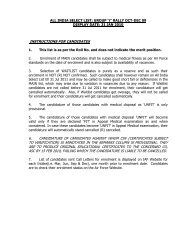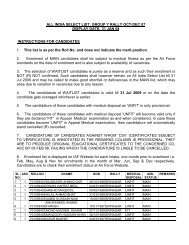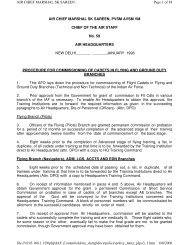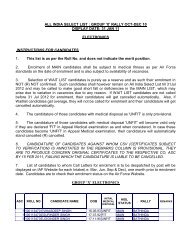You also want an ePaper? Increase the reach of your titles
YUMPU automatically turns print PDFs into web optimized ePapers that Google loves.
Mental health is an important aspect of<br />
total positive health. Every physical<br />
ailment has a mental component and<br />
every mental illness has a physical component.<br />
The WHO Expert Committee defines mental<br />
health as ‘the capacity of an individual to<br />
establish harmonious relations with others and<br />
to participate in or contribute constructively to<br />
change in the social environment’.<br />
Stress<br />
There is a lot of talk going around these days<br />
about stress. Almost every week, some medical<br />
journal or lay magazine brings out an article<br />
on this issue. Most of the<br />
time, doctors also tell their<br />
patients to cut down on<br />
their stress. However, to<br />
the general public and<br />
patients, it is quite vague and<br />
confusing. What is stress Why does it occur Can<br />
we do away with it Such questions can be quite<br />
intriguing.<br />
Stress Response<br />
It is actually not the stress that concerns us;<br />
what really concerns us is the “Stress Response”.<br />
This is the sum total of body reaction, both<br />
physiological and psychological, in response to a<br />
“stressor”. So, it is not really the “Stressor” (i.e. the<br />
situation) that leads to stress but our perception<br />
of that event, the meaning we attach to it and<br />
the way we react or respond to it, that leads to<br />
symptoms or diseases of stress.<br />
Stimuli from the environment or thoughts<br />
generated within the mind become amicable or<br />
inimical depending on whether they generate<br />
positive or negative effect. An inimical reaction<br />
brings on the fight response if one is angry and<br />
the flight response if one is insecure. We can alter<br />
our stress response from inimical to amicable<br />
and thereby cope with the stress stimulus.<br />
For example, let us say, to jump down to the<br />
ground from the roof, just 12 feet high, may be<br />
tremendously stressful for most of us. Majority<br />
of us, on looking down at the ground, would<br />
feel “butterflies in the stomach”. However, for a<br />
seasoned paratrooper, it would be fun. So, it is<br />
not the stressor (events, persons or environment)<br />
but our own interpretation and how we react<br />
decides whether we will get “stressed” or not.<br />
The Life Saving Stress Response<br />
The stress response in our<br />
body is meant for a protective<br />
and desirable reason. It is rather<br />
life saving. Evolution wise, our<br />
primitive ancestors, the Early Men,<br />
were exposed to various dangers at<br />
most unsuspected times - eg -when<br />
a hungry tiger suddenly pounced on<br />
them. To survive such flash emergencies,<br />
nature developed the “stress response” or “fight or<br />
flight” response in our body. Within milliseconds<br />
this would cause the heart to beat faster and<br />
more strongly and the blood pressure to rise (so<br />
that more and more blood laden with oxygen and<br />
glucose could go to the muscles, to either fight it<br />
out or run away). The breathing would become<br />
deep and extra glucose would be pumped into<br />
the blood by the liver, so that more of sugar and<br />
oxygen could be taken by the blood to the active<br />
muscles. Kidneys start saving water so that blood<br />
volume can increase, digestion reduces and<br />
blood from digestive organs is diverted to the<br />
active muscles. In addition, the blood clotting<br />
mechanism would increase so as to quickly seal<br />
off the wounds and minimize blood loss due to<br />
bleeding from injuries.<br />
So, where does all this fit into the problems<br />
of stress that we are talking about Well, the<br />
same stress response which was so protective<br />
during the evolutionary stages of human race<br />
has become a major hazard to our health. In<br />
our modern age life, we seldom face the kind of<br />
physical danger for which nature had designed<br />
the stress response. Even today, we need it on<br />
INDIAN AIR FORCE 2 0 1 2 J u n e Aerospace Safety 7

















